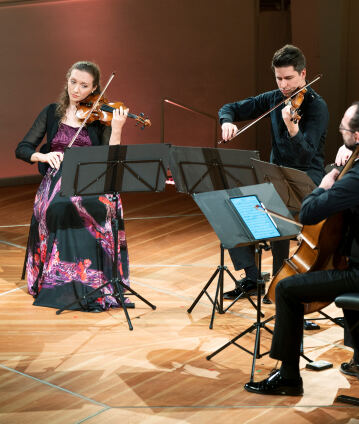“Schubert Marathon” – Part 2

Schubert’s chamber music is a world of its own. In our Schubert Marathon, Berliner Philharmoniker ensembles explore the musical landscapes of the composer’s soul. Here they present two string quartets with which Schubert wanted to “pave the way to the great symphony”. Song-like meets extreme drama and bold harmonies – especially in the quartet Death and the Maiden, whose turbulent mood is also shared by the Quartettsatz.
The legend is that Franz Schubert was an unrecognised genius during his lifetime. He was certainly successful, but almost exclusively as a composer of lieder and piano pieces. Almost all of the great instrumental works of his mature period, on the other hand, were only known and loved by posterity.
The Quartettsatz in C minor is Schubert’s only (and unfinished) attempt in the form of a string quartet in his middle years and an important stage on his “path to the great symphony”, which the composer himself later spoke of. The fullness of sound created by the tremolo of the instruments, the great emotional urgency and the expansiveness of the conception are striking. In the two string quartets also performed in this programme, it reaches epic dimensions.
The epithet of the quartet in A minor refers to the incidental music that Schubert composed for the stage work Rosamunde. The slow movement’s theme comes from it and is one of the composer’s most beautiful and best-known melodies. The work was premiered by the ensemble of the then famous violinist Ignaz Schupanzigh. However, Schupanzigh is said to have rejected the following string quartet in D minor with the words: “Brother, this is nothing, leave it alone; stick to your songs!” An astonishing comment on music which today is regarded as one of the highlights of the entire chamber music repertoire. In a certain sense, Schubert did actually “stick to his songs” here: for the theme of the poignant variation movement, he draws on his own setting of Matthias Claudius’s Der Tod und das Mädchen. Characterised by beauty, sadness and artistic maturity, the quartet confirms what the composer himself once said about his works: “My products exist through my understanding of music and through my pain.”
© 2024 Berlin Phil Media GmbH
Related interviews